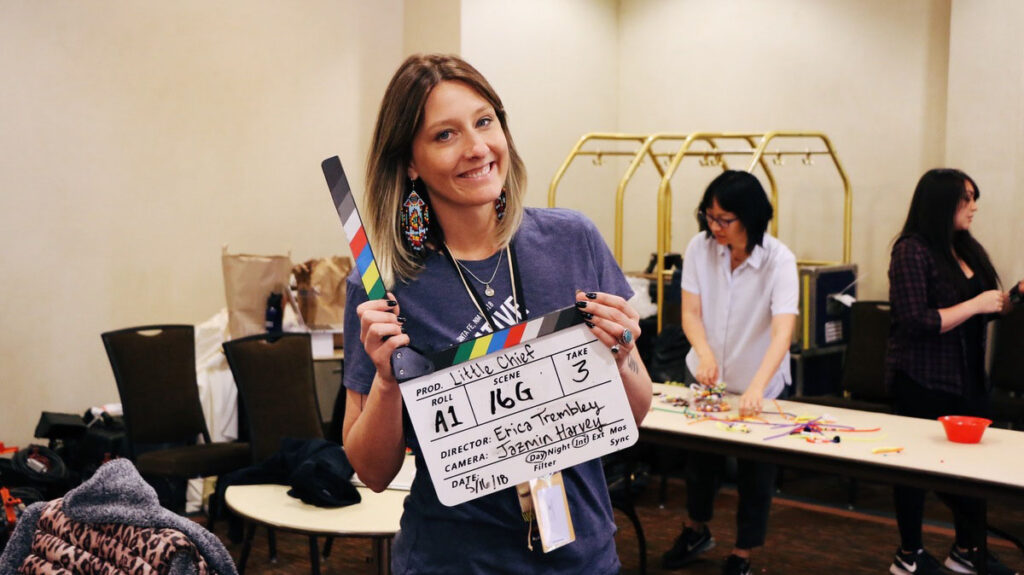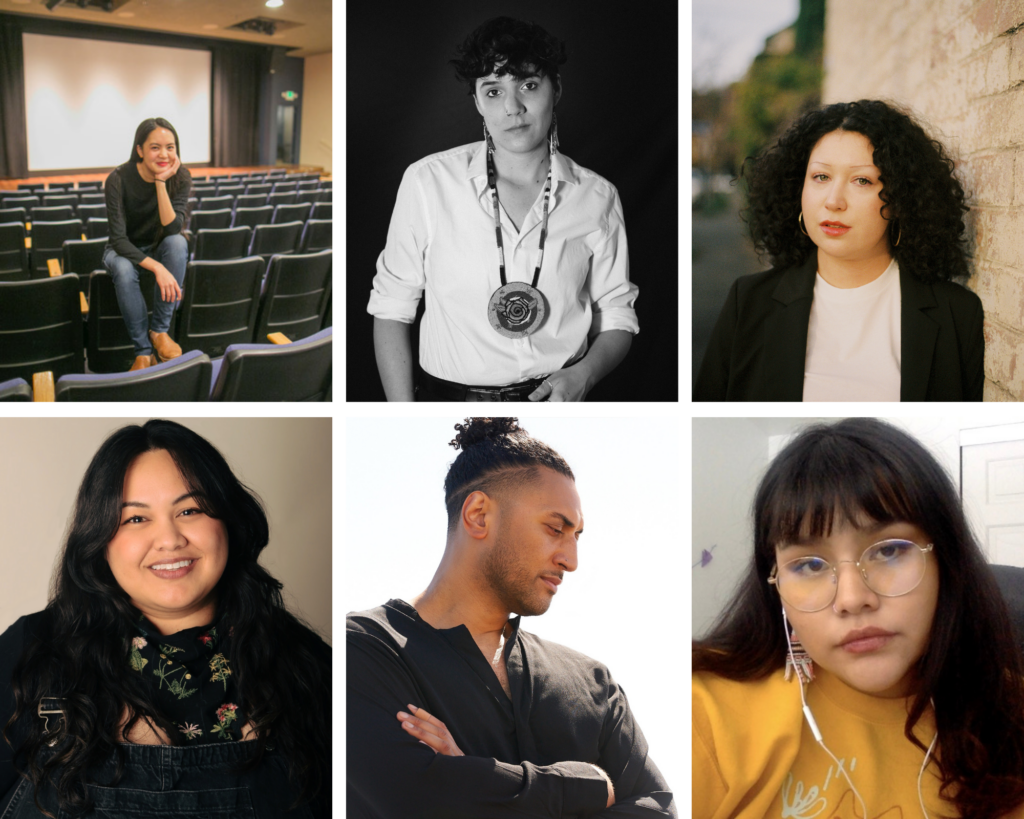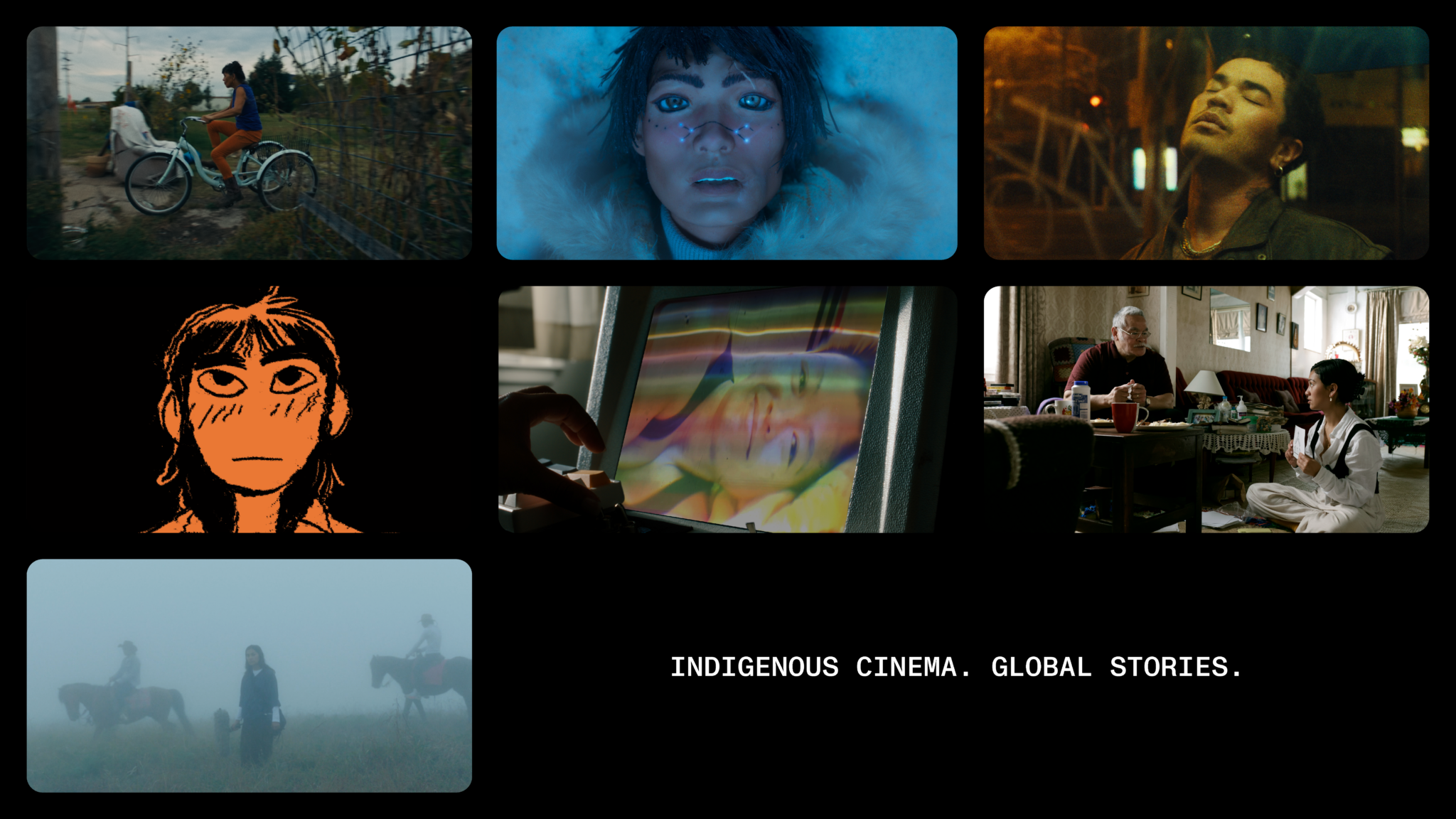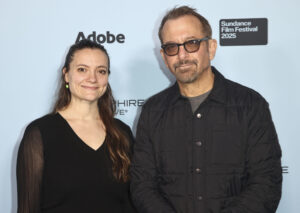By Katie Arthurs
The phrase “we stand on the shoulders of giants” was a sentiment taught to me as a child, but one that’s meaning didn’t fully seep in until I was older and setting out on my own. I found myself falling back on the things I learned from my parents and grandparents — and even my great grandparents — to get me through. Tips and tricks passed down to stretch a dollar helped like no other in my poor college years. Crafts and arts I had watched my elders make became a pastime that made me feel closer to home when homesickness kicked in. Listening to stories passed down made me feel seen and less alone in any problems I faced.
The circular view of time — in which all that came before doesn’t just disappear, but is something we carry with us both in the present and into the future — is a belief held by many tribes across Turtle Island. This belief is also ever present in the work made by Sundance Institute’s Indigenous Program–supported artists. With stories that focus on language, traditional stories, tribal history, family, and so much more, filmmaking is bringing a whole new way for Indigenous artists to showcase who they are and where they come from.
The Indigenous Program also tries to carry that belief into our work. We look to those who came before us and built this program from the ground up, we set out to build upon that great legacy in the present, and look to support even more artists and provide greater opportunities in the future.
Below, you can check out a few of the “giant’s shoulders” we stand on and their history with our work, what the program is currently doing, and what we see for the future.
Past

Sundance Institute’s Indigenous Program has a long history of supporting Indigenous made short films. From the Festival to the Native Lab, Indigenous filmmaking powerhouses Taika Waititi (Two Cars, One Night), Sterlin Harjo (Goodnight, Irene), and Erica Tremblay (Little Chief) are just some of the many artists supported.
Tremblay (Seneca-Cayuga Nation) attended Sundance Institute’s Native Lab as a fellow in 2018 with her short film Little Chief — a story about the lives of a Native woman and a nine-year-old boy intersecting over the course of a school day on a reservation in Oklahoma. Working with creative advisors Danis Goulet, Blackhorse Lowe, Jennifer Phang, and Chelsea Winstanley, the 2018 fellows shot workshop versions of scenes from their short films, gaining hands-on experience and 1:1 mentorship. Little did Tremblay know that her film would be selected to premiere at the 2020 Sundance Film Festival, and she would return herself as a creative advisor at the Native Lab to help mentor emerging Indigenous artists. Tremblay’s debut feature Fancy Dance premiered at the 2023 Sundance Film Festival, co-written by Indigenous Program alumna, Miciana Alise (Tlingit).
Present
Back again this year, the Indigenous Program has curated a 98 minute tour of Indigenous-made short films that have previously screened at the Sundance Film Festival. This program of seven short films is truly a celebration of the many facets of Indigeneity not just here on Turtle Island, but across the globe. Included in the program are four shorts from artists previously supported by the Indigenous Program: Don Eblahan’s Vox Humana (Philippines), Amanda Strong’s Inkwo: For When the Starving Return (Canada), Quinne Larsen’s Field Recording (U.S.A.), and Roberto Fatal’s En Memoria (U.S.A.). The program also features the winner of the 2025 Sundance Film Festival Short Film Special Jury Award for Directing: Tiger by Loren Waters, and two moving shorts from Pacifica filmmakers: Vea Mafile’o’s Lea Tupu’anga / Mother Tongue and Annelise Hickey’s Stranger, Brother.
The Indigenous Program worked with community partners in Hawai’i (Honolulu Museum of Art), New Mexico (Cinedoom), Oklahoma (Tulsa Film Collective), and California (Vidiots) to bring these shorts back to community by providing free screenings of the shorts tour. Now, the tour is available to be booked by other venues. You can find out more about the films in the program and how to book here.
Future

Each year the Indigenous Program team carefully crafts a new intensive around the needs they see for Indigenous filmmakers working on short films. Previous iterations have focused on documentary editing, supporting Two-Spirit artists, and most recently, supporting Native Hawaiian artists.
In recent years, the need for film funding and decreasing avenues to find it has been a constant struggle for many. With this in mind, and a generous grant from Apple, the Indigenous Program team invited six filmmakers to this year’s Short Film Granting Intensive. Each filmmaker will receive a $5,000 grant, a year of access to the Sundance Institute Collab platform, and a year of support from the Sundance Indigenous program team as they work to make their short films. “Our annual artist intensives have always been a space to explore some of the most dynamic and uncompromising Indigenous artists creating work in the moving image. This year is no exception and we’re thrilled to be supporting each of these filmmakers as they explore and create their short films on their own terms” says program director Adam Piron.
Below you can learn more about the six fellows and their projects.
The 2025 Indigenous Short Film Granting Intensive Fellows:
Lejend Yazzie with Teen Spirit!: Should I stay or should I go? This is the question on Dani’s mind, a Native punk teenager living on the reservation, when she learns of an unexpected pregnancy. With the help of her sisters she must decide between staying in her small town, or take a leap into the unknown for her and the baby.
Lejend Yazzie is a Diné film director, screenwriter, and producer. Born and raised in the Sonoran desert, she is now based in NYC pursuing her MFA at the Tisch School of Arts in Film/TV Production. She was a 2019 Full Circle Fellow and 2021 Indigenous Film Fund Fellow of the Sundance Institute Indigenous program. Inspiration for her work stems from her glittery experiences as a Native woman.
Gabz Norte with Qélawet: An unlucky, disillusioned forest creature floats through city life in search of a space that feels like home.
Gabz Norte is a Cahuilla & Cupeño multi-disciplinary artist and audiovisual archivist from Warner Springs, California. Inspired by the unconventional, gothic, and absurd image, her work focuses on the intersections of culture, identity, and memory with an emphasis on reimagining history, tradition, and experience through a Native lens.
Taylour Chang with The Pana O‘ahu Film Project: The Pana O‘ahu Film Project is a filmmaker’s perspective on tending to four sacred sites on O‘ahu. The piece reflects her evolving relationships with pre-contact ceremonial sites that have survived private, public, and military development.
Taylour Chang Taylour Chang is a filmmaker of Japanese, Chinese, and Native Hawaiian descent from Honolulu, Hawaiʻi. She serves as Director of Public Programs at Bishop Museum and was previously Director of the Doris Duke Theatre. The Pana O‘ahu Film Project is an extension of her work tending to certain heiau and kaʻananiʻau on O‘ahu. The work involves cleaning the sites and at times using a camera to better observe and care for the places.
Jacqueline Olivé with Like Father Like Daughter: In this darkly comedic hybrid animation documentary, an emotionally distant Tongan father and daughter–and her Japanese ex-boyfriend who lives with them–spend a year having multilayered conversations and family dinners that reveal if they can accept each other for who they’ve become.
Jacqueline Olivé is a Tongan filmmaker from Nevada. Fluent in English and Japanese, her work empathetically interrogates themes of identity, legacy, and belonging to subvert expectations. Olivé recently won two Student Emmys for her documentary on land reparations in Las Vegas, did translation work on Apple TV’s Pachinko, and joined the PEAK Writers Fellowship with Netflix for emerging Pasifika writers in Hollywood. Currently, Olivé is directing and producing two documentaries with Pacific Islanders in Communications.
Kristian Fanene Schmidt with Otila: My Mother’s Journey: In 1953, the Fanene family left the islands of Samoa for Aotearoa (New Zealand) in search of a better life. Was the vision of a better life real? Was it realized? And if so, at what cost? 70 years after the fact, Odila Fanene-Schmidt seeks to answer these questions and recalls the challenges that came with assimilation to their new home, including separation from culture, family, and self.
Kristian Fanene Schmidt (he/him) was born and raised in Porirua, Aotearoa while both his parents hail from Samoa. As a Fulbright scholar with degrees in Law, Education and Arts (Pacific Studies) and over 20 years of community service to inform his work as a writer, host, and consultant, he has partnered with the likes of Paramount, Disney, Amazon, Ubisoft, Netflix, and LucasFilm, sharing his expertise on representation, LGBTQIA+ issues, and the impacts of colonization throughout the Pacific. He is the Executive Producer on Island Fever Podcast and co-founder of the Pasifika Entertainment Advancement Komiti (PEAK); an organization committed to redefining, expanding, and honoring the richness of Pasifika experiences.
Jenna Warwick with Spiritual Primitive: Spiritual Primitive uncovers the spiritual origins of Australia’s European settlers by recontextualising the work of Peter Weir and Celebrations of Midsummer in East Anglia and Warwickshire, England. Taking an anthropological lens to Australian new wave cinema and a 1964 rural English documentary, Spiritual Primitive explores the paradoxes of settler superiority.
Jenna Rain Warwick is a Proud Luritja artist and researcher who lives on Wurundjeri Country. Her research encompasses Australian film history as it relates to extractive industries and the construction of the ‘Australian’ on screen. Her work uses cinema to question and probe the settler colony, ruminating on the prompt that if all Indigenous land and their people are one and the same, then mob have starred in every movie shot in so-called Australia








